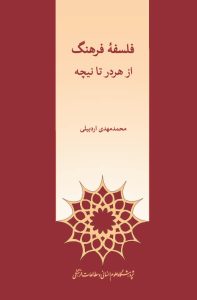
| Title | Philosophy of culture: From Herder to Nietzsche |
| Author | Ardebili, Mohammad Mehdi |
| Publisher | Institute for Humanities and Cultural Studies |
| First published | 2021 |
| Number of pages | 210 |
Although thinking about “culture” has a long history, what is known today as “philosophy of culture” is primarily influenced by the opinions of German thinkers of the 18th and 19th centuries. The modern understanding of culture is formed in this same period, and analysis of the historical and conceptual relationship between the concepts of Kultur and Bildung plays a vital role in understanding the foundations of philosophy of culture. Despite the conceptions of Rousseau, Diderot, Voltaire, Vico, Leibniz, and others, it can be demonstrated that Herder is the first thinker who assigned a metaphysical and philosophical status and meaning to culture. As a result, the present book begins its discussion by extracting a kind of philosophy of culture from Johann Gottfried von Herder, and after touching on the meaning of culture in the critical philosophy of Immanuel Kant, it is led to the zenith of the confrontation between modern philosophy and culture in Georg Wilhelm Friedrich Hegel. After depicting the modern confrontation with culture, from Herder to Hegel, this book concludes with a discussion of one of history’s most controversial thinkers, Friedrich Nietzsche. As the most brazen harbinger of the collapse of ideas and ideals, he can be deemed the herald of a new cultural world whose distinctive feature is the very same nihilism that we all live in today.
